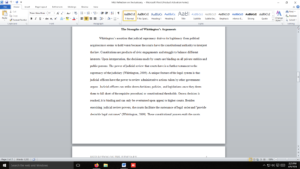Judicial Supremacy
This module is on the U.S. Judiciary as an institution, specifically its supremacy in interpreting the U.S. Constitution. This assignment is intended to be a reflective paper on what you have read in the fourth module of the course. The paper is to be a minimum of three and maximum of five pages in length, double-spaced, with standard margins and no cover page. Make sure you include your name and “Reflection Paper #4” on the first page of the paper. Papers are to be uploaded to Canvas. This paper is due on Monday, July 27, by 11:59 p.m. You may earn up to 150 points.
The main purpose of this assignment is for you to reflect on and express what you learned and gained from the assigned readings in Whittington’s “Political Foundations of Judicial Supremacy,” and your opinion as to the validity, strengths, or weaknesses of the arguments presented. It is important that your paper is coherent, uses correct grammar, punctuation and spelling, and expresses your own conclusions and points of view. Your grade will be based on the quality of your writing, and its completeness in considering Whittington’s main conclusions and arguments. You should carefully cite any writings that are not your own. Your paper will be scanned for plagiarism.
Your grade will be based on the quality of your writing, and its completeness in considering the assigned chapters from “Judicial Supremacy.” You should consider at least the following questions:
What is Whittington’s main argument and conclusions? What are its strengths and weaknesses?
Do you agree or disagree with Whittington?
What is the interplay Whittington suggests regarding judicial power and the roles of the presidency and congress?
What did you learn about the federal judiciary, specifically the U.S. Supreme Court, that you didn’t know or consider before?
Answer preview
Whittington’s assertion that judicial supremacy derives its legitimacy from political acquiescence seems to hold water because the courts have the constitutional authority to interpret the law. Constitutions are products of civic engagements and struggle to balance different interests. Upon interpretation, the decisions made by courts are binding on all private entities and public persons. The power of judicial review that courts have is a further testament to the supremacy of the judiciary (Whittington, 2009). A unique feature of the legal system is that judicial officers have the power to review administrative actions taken by other government organs. Judicial officers can strike down decisions, policies, and legislations once they deem them to fall short of the requisite procedural or constitutional thresholds. Once a decision is reached, it is binding and can only be overturned upon appeal to higher courts. Besides exercising judicial review powers, the courts facilitate the sustenance of legal order and “provide desirable legal outcomes” (Whittington, 2009).
[1333 Words]

Judicial Supremacy

